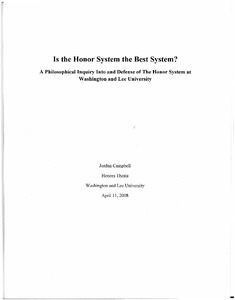| dc.rights.license | In Copyright | en_US |
| dc.creator | Campbell, Jordan Christian | |
| dc.date.accessioned | 2023-10-20T15:49:39Z | |
| dc.date.available | 2023-10-20T15:49:39Z | |
| dc.date.created | 2008 | |
| dc.identifier | WLURG038_Campbell_thesis_2008 | |
| dc.identifier.uri | https://dspace.wlu.edu/handle/11021/36291 | |
| dc.description.abstract | While the Honor System at Washington and Lee (W&L) is widely regarded as one of the most important and consequential aspects of the school by both alumni and current students, and while it is regarded as one of the most effective Honor Systems or Codes among all universities in the United States, there still remain a number of questions about it. Though it seems to be attacked from a multitude of angles, I believe all of the issues center around one question: is it the best system, or is there a better system? Certainly opponents of the System acknowledge that there may be some beneficial aspects of or side effects of it. However, opponents of the System have questioned both the goals of the System as well as its methods of achieving, or trying to achieve, those goals. Are the ends that the System seeks appropriate ends for an Honor System to strive for? Is basing a school's ultimate judicial system on Honor, a seemingly nebulous concept that can be widely interpreted, with no codification fair to the students governed by it? Is having only a single sanction, dismissal from the university, fair to the students found guilty of an Honor Violation, and is it the best punishment system? So certainly these questions make us wonder whether or not it is the best system. The purpose of this paper, then, will be two-fold. First, we will examine what the goal(s) or end(s) of the Honor System is/are. Secondly, we will examine whether or not the means by which it goes about attaining those ends are fair or the best way of attaining those ends. What I will argue for in this
paper is that once we understand the ends of the Honor System, then we will be able to defend against its greatest objections, objections to the means of attaining those ends. And thus we will ultimately be able to conclude that, indeed, it may very well be the best system. [From Introduction] | en_US |
| dc.format.extent | 41 pages | en_US |
| dc.language.iso | en_US | en_US |
| dc.rights | This material is made available for use in research, teaching, and private study, pursuant to U.S. Copyright law. The user assumes full responsibility for any use of the materials, including but not limited to, infringement of copyright and publication rights of reproduced materials. Any materials used should be fully credited with the source. | en_US |
| dc.rights.uri | http://rightsstatements.org/vocab/InC/1.0/ | en_US |
| dc.subject.other | Washington and Lee University -- Honors in Philosophy | en_US |
| dc.title | Is the Honor System the Best System?: A Philosophical Inquiry Into and Defense of the Honor System at Washington and Lee University | en_US |
| dc.type | Text | en_US |
| dcterms.isPartOf | WLURG038 - Student Papers | en_US |
| dc.rights.holder | Campbell, Jordan Christian | en_US |
| dc.subject.fast | Washington and Lee University | en_US |
| dc.subject.fast | College students--Conduct of life | en_US |
| dc.subject.fast | Honor system (Higher education) | en_US |
| local.department | Philosophy | en_US |
